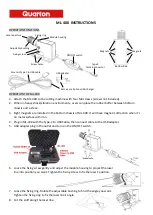
13
5.8 Calibration of rate display using internal
references: SEt
This function enables the zero and span of the
rate display to be adjusted without the need for
an accurate external current source, or for
disconnection from the 4/20mA loop.
The accuracy of this method depends upon the
accuracy of the internal references which should
be regularly calibrated as described in section
5.9.2
To calibrate the rate display select 'SEt' from the
main menu and press
P.
The instrument will
display 'ZErO', pressing
P
again will reveal the
current display at 4mA. For flow applications
this will usually be zero. Each digit of the rate
display can be changed by pressing the
Up
or
Down
buttons. When the first digit is correct
pressing
P
will transfer control to the next digit.
When the least significant digit has been
adjusted, press
E
to return to the 'ZErO' prompt
which completes the adjustment.
To adjust the display at 20mA, press the
Up
button which will cause the instrument to display
'SPAn'. Pressing
P
again will reveal the indicator
display. Each digit can be changed by pressing
the
Up
or
Down
buttons. When the first digit is
correct, pressing
P
will transfer control to the
next digit. The most significant digit, which can
be 1 or 2, is set by rolling-over the previous digit.
When all the digits have been adjusted press
E
t
o return to the 'SPAn' prompt, followed by
E
to
return to the main menu.
5.9 Conditioning sub-menu: Cond
This sub-menu allows the mains (line) frequency
at which the instrument has maximum ac
rejection to be selected and the two internal
references to be calibrated. These functions are
contained in a protected sub-menu to minimise
the possibility of accidental adjustment. To gain
access to the sub-menu select 'Cond' from the
main menu and press
P
which will cause the
instrument to display '0000'. Using the
Up
, and
Down
buttons and the
P
button to move to the
next digit enter the password 'SurE'. Pressing
E
will then give access to the sub-menu. Note 'S'
is entered as '5'.
5.9.1 AC rejection: FrE
WARNING
If the mains filter frequency is
changed, the rate display and the
internal references (if used) must
be recalibrated.
To provide maximum low frequency rejection the
internal digital filter may be set to operate at 50
or 60Hz to correspond with the local mains (line)
frequency. To change the frequency select
'FrE' from the 'Cond' sub-menu and press
P
which will reveal the current setting. The setting
can be changed by pressing the
Up
or
Down
buttons followed by the
E
button to return to the
sub-menu.
5.9.2 Calibration of internal references: rEF
The BA554D contains two references
representing 4 and 20mA. These are used in
the 'SEt' function which enables the rate display
to be calibrated without an external current
calibrator. They are also used in the 'C--P'
function when the
P
push-button is programmed
to display the input current in the operating
mode. If either of these two functions are used,
the internal references should be routinely
calibrated against an external 4/20mA calibrator
connected to the input terminals of the
instrument. See section 7.4
To calibrate the internal references select 'rEF'
from the sub-menu and press
P
which will result
in a '.004A' prompt being displayed. Adjust the
external current calibrator to 4.000mA and
again press
P
. The instrument will display 'Ent'
while the 4mA reference is being updated and
will then return to the '.004A' prompt.
To re-calibrate the 20mA internal reference,
press the
Up
button which will cause the
instrument to display '.020A'. Adjust the external
current calibrator to 20.000mA and again press
P.
The instrument will display 'Ent' while the
20mA reference is being updated and will then
return to the '.020A' prompt. This completes
calibration of the internal references, two
operations of the
E
button will return the
instrument to the 'Cond' prompt in the main
menu.














































